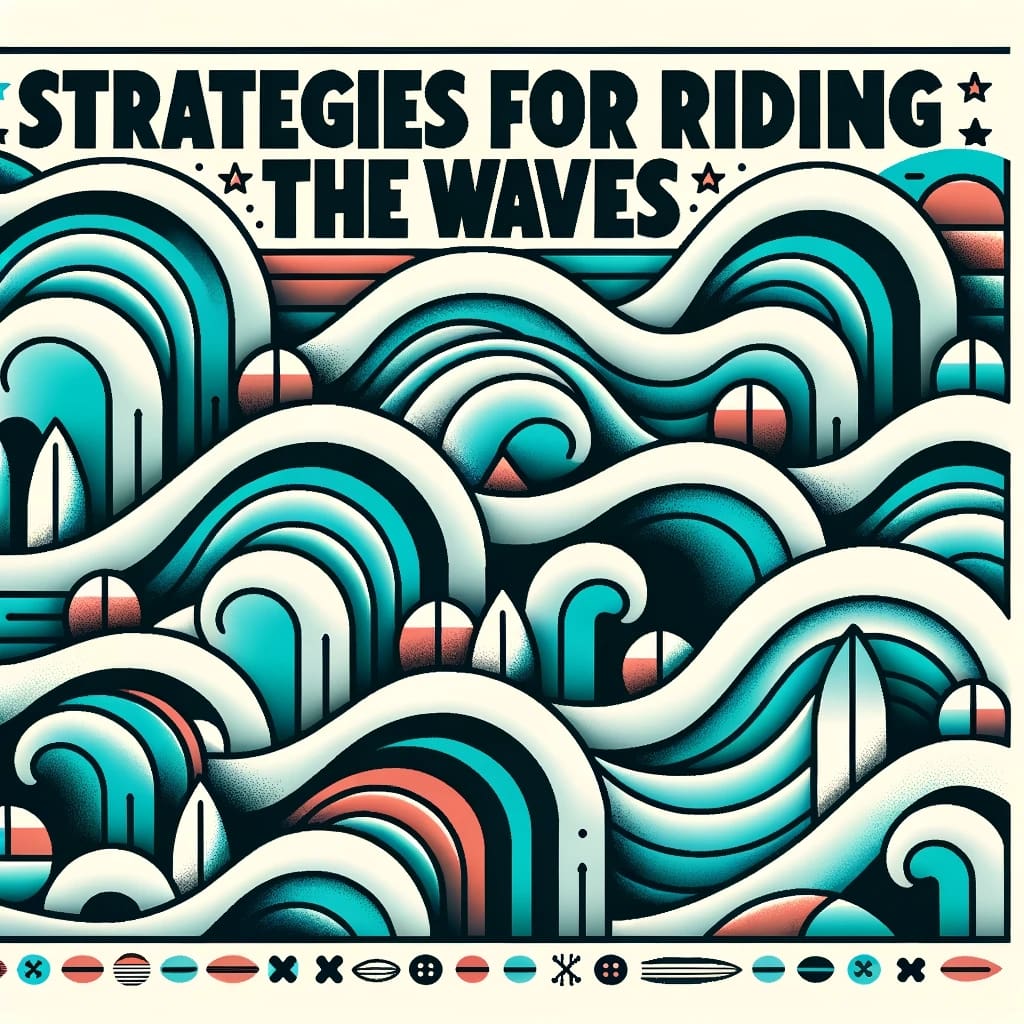Life is full of emotional ups and downs. We all experience times of joy, excitement, sadness, frustration, and more. Like waves in the ocean, our emotions can feel like they are constantly rising and falling. Learning to roll with these emotional waves is key to building resilience and maintaining well-being. This blog post explores practical strategies for riding the highs and lows of our emotional lives.
| Key Takeaways on Riding Emotional Waves | |
|---|---|
| 1. | Emotions naturally fluctuate like waves – we experience ups and downs. Learning to manage this variability is key to well-being. |
| 2. | Mindfulness, keeping perspective, connecting with others, and taking care of your body help smooth out emotional highs and lows. |
| 3. | Reframing situations constructively, understanding your triggers, developing helpful routines, and engaging in enjoyable activities provide stability when emotions feel chaotic. |
| 4. | Finding healthy ways to express yourself prevents emotions from building unchecked. Pause before reacting impulsively. |
| 5. | Emotional resilience takes practice but allows you to surf life’s challenges and blessings with more grace, wisdom, and joy. Ride the waves skillfully. |
| 6. | Building resilience requires that we become advanced emotional surfers. With the right strategies and practice, you can learn to ride life’s inherent ups and downs smoothly. The natural ebb and flow become fluid rather than a struggle. Master your emotional waves. |
Understanding Emotional Waves

Emotions are a normal and healthy part of being human. But sometimes, our emotions can feel like they are on a rollercoaster, quickly veering from positive to negative states. Dr. Susan David, a psychologist at Harvard Medical School, refers to these shifts as “emotional agility.” She explains that emotions are not static states but rather phenomena that pass through us.
Just like waves in the ocean come and go, our emotions rise and fall. Visualizing emotions as waves allows us to gain perspective and remember that no feeling lasts forever. Even intense emotions will crest, break, and dissipate. Riding these waves skillfully allows us to cultivate resilience.
Why do emotions fluctuate?
There are a few key reasons why our emotions can feel so variable day-to-day:
- External events – Things happening around us impact how we feel. Getting a promotion at work or having plans fall through influences our emotional state.
- Thought patterns – The way we interpret events shapes how we feel about them. For example, making a mistake could plunge you into shame or be seen as an opportunity to learn.
- Brain chemistry – Hormones, neurotransmitters, and other biological factors affect emotions. Imbalances may contribute to mood swings.
- Health and lifestyle – How much sleep, nutrition, exercise, and relaxation we get impacts wellbeing. Disruption can make emotional waves feel more turbulent.
While we cannot avoid emotional fluctuations, we can learn to surf them with greater skill.
Strategies for Riding the Waves

When we get caught up in an emotional wave, it can feel all-consuming in the moment. Emotional resilience requires that we develop tools to smooth out the highs and lows. Here are some strategies for balancing emotions through life’s ups and downs:
1. Practice mindfulness
Mindfulness means paying attention to the present moment with intention and without judgment. Setting aside time each day for mindfulness meditation is a great way to get centered and focused. You can use an app like Calm or Headspace to guide you.
Mindfulness allows us to witness our emotions as they rise and fall without getting wrapped up in them. This helps us avoid reacting rashly when difficult feelings arise. It also prevents us from clinging too tightly to positive emotions and wanting them to last forever. With mindfulness, we can watch thoughts and feelings come and go like waves.
2. Keep perspective
When you’re in the trough of a wave, it can feel like you are drowning in sadness, anger, or anxiety. You may feel like you’re flying high at the peak, and nothing can bother you. In both cases, perspective is key.
Remember that no single instance defines your entire life. Emotional waves eventually crest and break. Ride them out by keeping the bigger picture in mind. Maintaining perspective on individual situations prevents us from catastrophic thinking when things go wrong or assuming permanent bliss when things go right.
3. Lean on others
You don’t have to navigate turbulent emotional waters alone. Reaching out to supportive friends, family members, coworkers, or mental health professionals can make a huge difference.
Other people can serve as anchors when we feel adrift on powerful feelings like grief, rage, or fear. They remind us that we are tethered to something secure. Talking through concerns, getting encouragement, or just feeling heard helps enormously. Don’t isolate yourself when big feelings arise.
4. Take care of your body
Our physical condition profoundly impacts emotional resilience. Getting enough sleep, eating nutritious foods, staying hydrated, and exercising provide stability when emotional waves are rocking your boat.
Healthy habits give you the energy and focus needed to cope effectively with life’s ups and downs. Managing stress through relaxation techniques like yoga, deep breathing, massage, or time in nature also helps smooth out mood swings. Make self-care a priority.
5. Adjust your outlook
How we think about and explain events to ourselves plays a major role in how we feel. Reframing situations in a more positive or constructive light can transform anger into understanding or sadness into appreciation.
For example, getting laid off could be viewed as a chance to pursue something more fulfilling. Framing a breakup as an opportunity to learn and grow is healthier than ruminating over rejection. Be willing to change your perspective.
6. Know your triggers
We all have situations, times of day, or phases in life that tend to spark more emotional reactivity. For instance, you may tend to feel more irritable on busy mornings. Holidays or anniversaries often amplify sadness and loneliness.
Pinpoint your triggers so you can anticipate them and prepare effectively. If the pre-work morning rush stresses you out, build in extra time. Make a point of planning pleasant activities around painful anniversaries. Avoid contexts you find emotionally exhausting when possible.
7. Cultivate calm routines
Establishing regular routines creates structure and a sense of calm when emotional waves are swirling. Having predictable rituals like an evening walk, reading before bed, or Friday night pizza night provides comfort.
Pleasant habits give you something positive to hold onto. When emotions are running high, routines act like anchors keeping you steady. They also limit impulsive actions you might take in highly charged states. Routines keep the ship on course.
8. Express yourself
Bottling up emotions tends to magnify their intensity. Finding healthy ways to share what you are feeling prevents pressure from building unchecked. Talk to trusted friends and family. Write in a journal. Make art or music.
Let emotions out so they can run their course. Use the arts to give shape and meaning to inner experiences. Expressing yourself helps emotions flow through you like waves rather than trapped pools. Release, don’t repress.
9. Engage in activities you enjoy
It’s easy to stop doing things you love when you’re caught up in painful or positive emotional waves. But hobbies, sports, social activities, and creative pursuits are powerful mood stabilizers. They take your mind off worries or excessive euphoria.
Make sure to keep engaging in activities that bring you joy. Pursue passions that make you feel centered, energetic, accomplished, or relaxed. Movement, social connection, nature, and creative flow smooth out your emotional sea.
10. Pause and breathe
When emotions surge, our instinct is often to react. Intense feelings fog clear thinking and result in impulsive decisions we may later regret like angry outbursts or hasty purchases. Before you act on a wave of emotion, press pause.
Take a few deep breaths, walk away from the situation, or sleep on it. Creating space to respond thoughtfully rather than react rashly short-circuits the tidal pull of emotions. You cannot stop waves, but you can learn to surf them masterfully.
Key Takeaways on Riding Emotional Waves
- Emotions naturally fluctuate like waves – we experience ups and downs. Learning to manage this variability is key to well-being.
- Mindfulness, keeping perspective, connecting with others, and taking care of your body help smooth out emotional highs and lows.
- Reframing situations constructively, understanding your triggers, developing helpful routines, and engaging in enjoyable activities provide stability when emotions feel chaotic.
- Finding healthy ways to express yourself prevents emotions from building unchecked. Pause before reacting impulsively.
- Emotional resilience takes practice but allows you to surf life’s challenges and blessings with more grace, wisdom, and joy. Ride the waves skillfully.
Building resilience requires that we become advanced emotional surfers. With the right strategies and practice, you can learn to ride life’s inherent ups and downs smoothly. The natural ebb and flow become fluid rather than a struggle. Master your emotional waves.
FAQS
Why do our emotions fluctuate so much?
Our emotions fluctuate in response to external events, thought patterns, brain chemistry changes, and lifestyle factors. Emotional ups and downs are a normal part of being human.
What are some benefits of learning to ride emotional waves?
Handling emotional highs and lows smoothly allows us to avoid poor decisions, maintain perspective, enjoy more stability, and develop wisdom. Resilience helps us stay balanced through life’s challenges.
How can I stay calm when faced with upsetting events or moods?
Strategies like mindfulness, exercise, talking to trusted friends, and taking deep breaths can help you respond thoughtfully rather than rashly.
Are some people just born more emotionally resilient than others?
While some genetic factors influence emotional variability, resilience skills can be learned and developed with practice over time. Anyone can become better at riding emotional waves.
What should I do if my mood swings seem extreme and unmanageable?
If emotions feel completely out of control or you struggle with depression or anxiety, seeking professional mental health support can help greatly. Therapists provide tools tailored to your situation.

